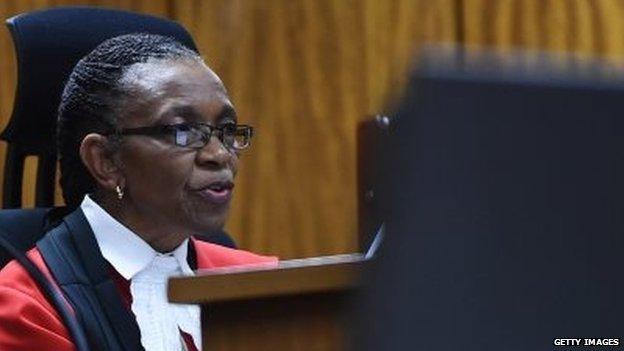Oscar Pistorius verdicts divide South Africa
- Published

Members of the ANC Women's League sang songs in support of Reeva Steenkamp and her family
Two courts in South Africa are now debating Judge Thokozile Masipa's verdict so far in the Oscar Pistorius trial - the court of public opinion and that of legal experts.
Legal experts say she followed the law impeccably, by looking at the evidence before her and then evaluating whether the state had proven its case.
But others have been unsettled by her ruling that Mr Pistorius was not guilty of murder, though she has yet to reveal her verdict on the lesser charge of culpable homicide.
While the law makes provisions for how criminal matters should be handled, judges, as custodians of the law, ultimately use their discretion.
Judge Masipa took the view that the state had failed to prove Mr Pistorius had intended to kill someone, so he could not be convicted of murder.
"The evidence failed to prove the accused had intention [to kill]," she said. "The accused had the intention to shoot at the person behind the door, not to kill."
Respected veteran judge Willem Heath says Judge Masipa could only base her verdict on the evidence before her and the facts of the case.
"She went to the crux of the evidence. On the evidence presented, I am in agreement with her there is just not evidence that he had intention to kill," he says. "She had to analyse the evidence and apply the law to that."
Lawyer Mannie Witz agrees, saying: "The minute you knock out intention, it can't be murder."

Judge Masipa said the state had not proven its case
But Mr Witz says prosecutors may have grounds to appeal over how the judge interpreted the law with regard to the lesser murder charge of dolus eventualis, of which the athlete was cleared.
In South African law, this charge - also known as common-law murder, as distinct from premeditated murder - applies if the accused knew they might kill someone but still went ahead with their course of action.
The judge's critics argue that dolus eventualis includes the possibility of meaning to kill one person and ending up killing another. But Judge Masipa dismissed this possibility: "Clearly he did not subjectively foresee this as a possibility that he would kill the person behind the door - let alone the deceased - as he thought she was in the bedroom," she said.
That prompted legal expert professor Pierre de Vos to tweet: "Not sure rejection of dolus eventualis is correct here.
"Surely if you shoot into a door of a small toilet and know somebody behind door you foresee and accept possibility of killing?"



The athlete was overcome with emotion for much of the time
Mr de Vos thinks this should be enough for a conviction for murder.
But as Mr Witz points out "the onus is on the state to prove its case beyond reasonable doubt, while Mr Pistorius' version only needed to be reasonably or possibly true".
On social networking sites and among the crowds outside court, many say they feel Mr Pistorius got off lightly.
"I think he should have been found guilty of murder. Killing is killing," says Lindokuhle Mohale, who was watching proceedings on a screen outside court.
But Ms Mohale's friend, Julia Ntseki, disagrees.
"I believe that is was an honest mistake. Yes it was wrong but it was a mistake. He didn't mean to kill - that can't be murder," she says.

The Steenkamps were in court to hear the judgement into their daughter's killing
Nearby, women carrying "Stop killing us" placards sang mournful songs in support of Reeva Steenkamp and her family.
"Women are being killed and nothing is happening. Our daughters are being killed. What he did was wrong," said one of the protesters.
"The law has double standards, women seem to always lose."
Another protester said: "South Africa has a big problem with violence against women. What message is this sending? Won't men think they can kill us and simply say it was a mistake?"